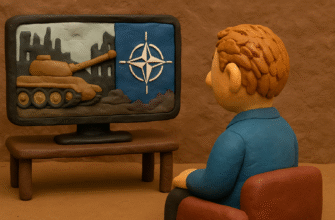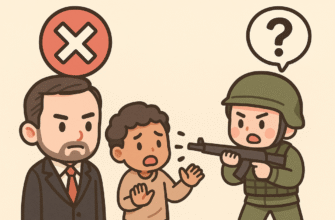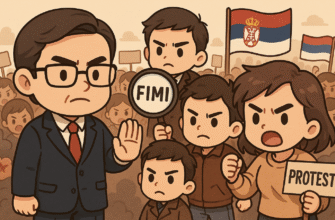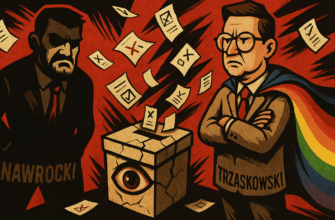We return to publishing Fact-Checking after a two-month break with new ideas on how to make these issues more regular and cover more problems of Belarusian information security due to existing disinformation threats.
Factchecknet.uz from Uzbekistan conducted a check of the news about the ranking of dangerous countries.
The Global Peace Index is a comprehensive indicator that characterizes the peacefulness of countries around the world by measuring the level of violence within the state and the aggressiveness of its foreign policy. Thus, it is not a ranking of the most dangerous countries, but a distribution of countries according to 23 qualitative and quantitative indicators in three areas:
- level of public safety and security;
- degree of ongoing domestic and international conflict;
- degree of militarization.
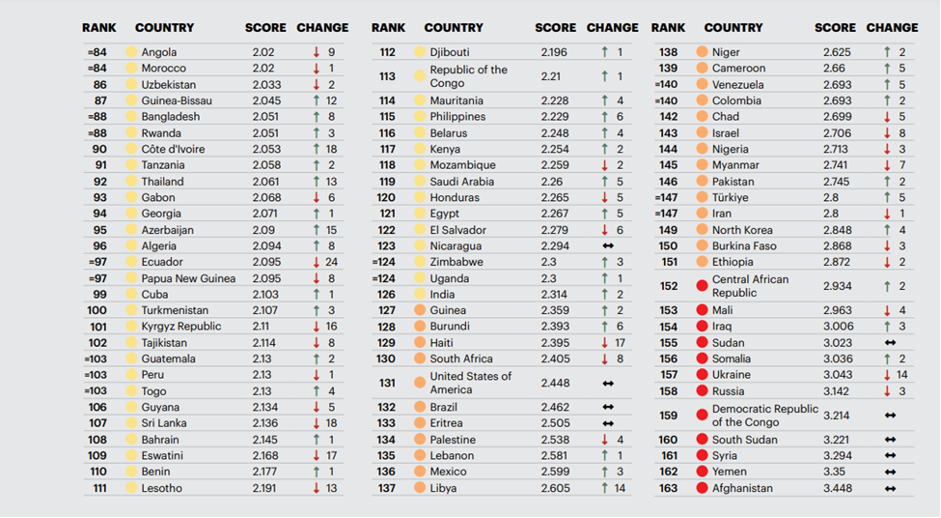
Its results were published in June 2023. The report emphasizes that for the sixth year in a row, Afghanistan is the least peaceful country, followed by Yemen, Syria, South Sudan, and the Democratic Republic of the Congo. Uzbekistan ranks 86th in this ranking, while the Republic of Belarus is only in 116th place.
Kazakhstan’s FactCheck.kz published an investigation by the fact-checkers from Snopes, who decided to verify the authenticity of the words attributed to Russian President Vladimir Putin. It was reported that in October of this year, Putin said: “There is no other way to help the Palestinians except by fighting those who stand behind their conflict, and we are fighting them in Ukraine.” The quote continues to be spread on the Net, for example in social network X (former Twitter); also here and here.
Fact-checkers found that the media did indeed quote these words. In particular, Reuters wrote on October 30: “In a televised address at a meeting of the Security Council and government members, as well as law enforcement heads, Putin said that the ‘ruling elites of the USA’ and their ‘satellites’ were behind the killings of Palestinians in Gaza, as well as conflicts in Ukraine, Afghanistan, Iraq, and Syria.” “Palestine can only be helped by fighting those who stand behind this tragedy. We are Russia, and we are fighting them within the framework of the ‘special military operation’. For ourselves and for those who strive for true, real freedom,” the agency quotes Putin’s words.
Additionally, fact-checkers found these words on the official Kremlin website and compared the quote, translated into English, with the original. Despite the fact that the exact wording in the source differs somewhat from what is circulated on social networks (for example, the speech refers to “Palestine,” not “the Palestinians” — Factcheck.kz), the overall meaning is preserved. And the authors of the check conclude that the attribution of the quote is correct.
Factcheck.kg in the article Fake Epidemic: Infocalypse in the World and Kyrgyzstan referred to a March study this year Media Consumption and Disinformation in Central Asia: Quantitative and Qualitative Assessment in the Context of Geopolitics. The study identified four categories of the population that can be called the most likely victims of disinformation: the elderly, the young generation, people with a low level of education, and the rural population. The common characteristic that makes them more vulnerable, based on interview responses, is the lack of critical thinking and the inability to double-check or verify information.
Let’s present two charts from the media study:
Consumption of international news sources by country
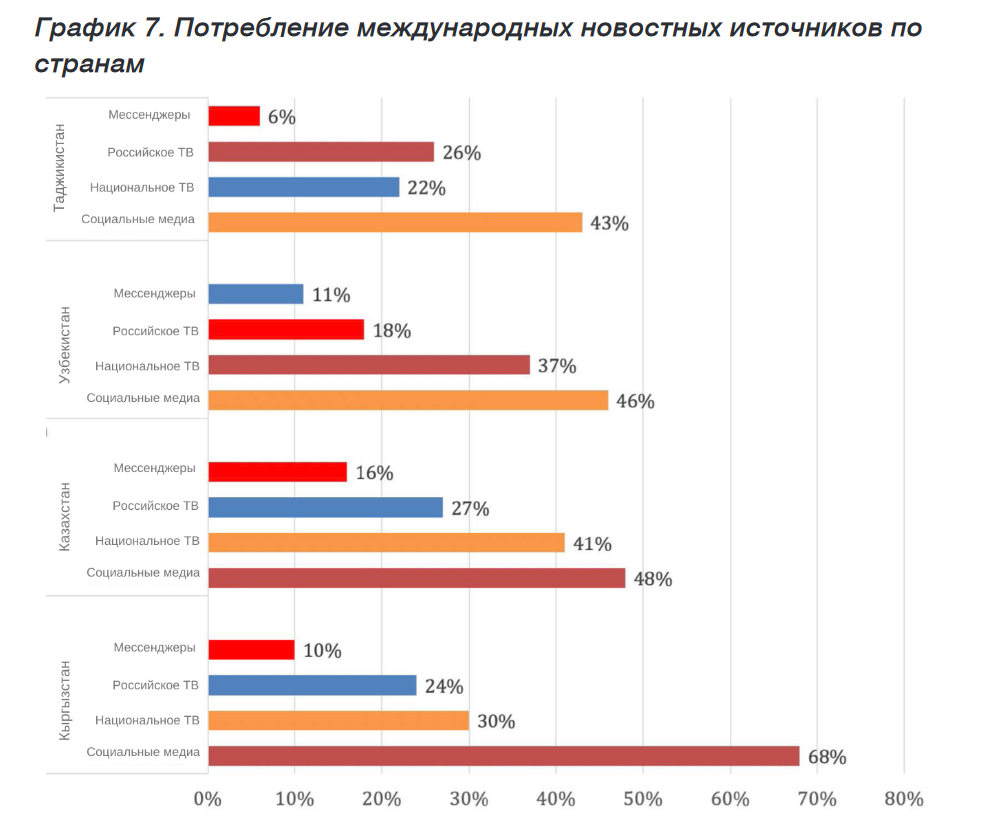
The research questions related to the opinion of respondents about the situation in Ukraine and associated news consumption models were only asked in Kyrgyzstan and Kazakhstan. Due to the sensitivity of the topic, it was decided not to ask questions about Ukraine in Tajikistan and Uzbekistan.

This chart could be the focus of the discussion on the influence of Russian disinformation and propaganda in the countries of Central Asia. Researchers found a significant difference between respondents using different information sources: among those who use Russian TV channels, half of the respondents blame the USA, while consumers of Central Asian TV channels and social network users are less likely to blame the USA for the situation in Ukraine.
Fact-checkers from Factcheck.ge dissected disinformation about the purchase of yachts by Ukrainian President – Volodymyr Zelensky. This disinformation did not receive distribution in mentions in Belarus:
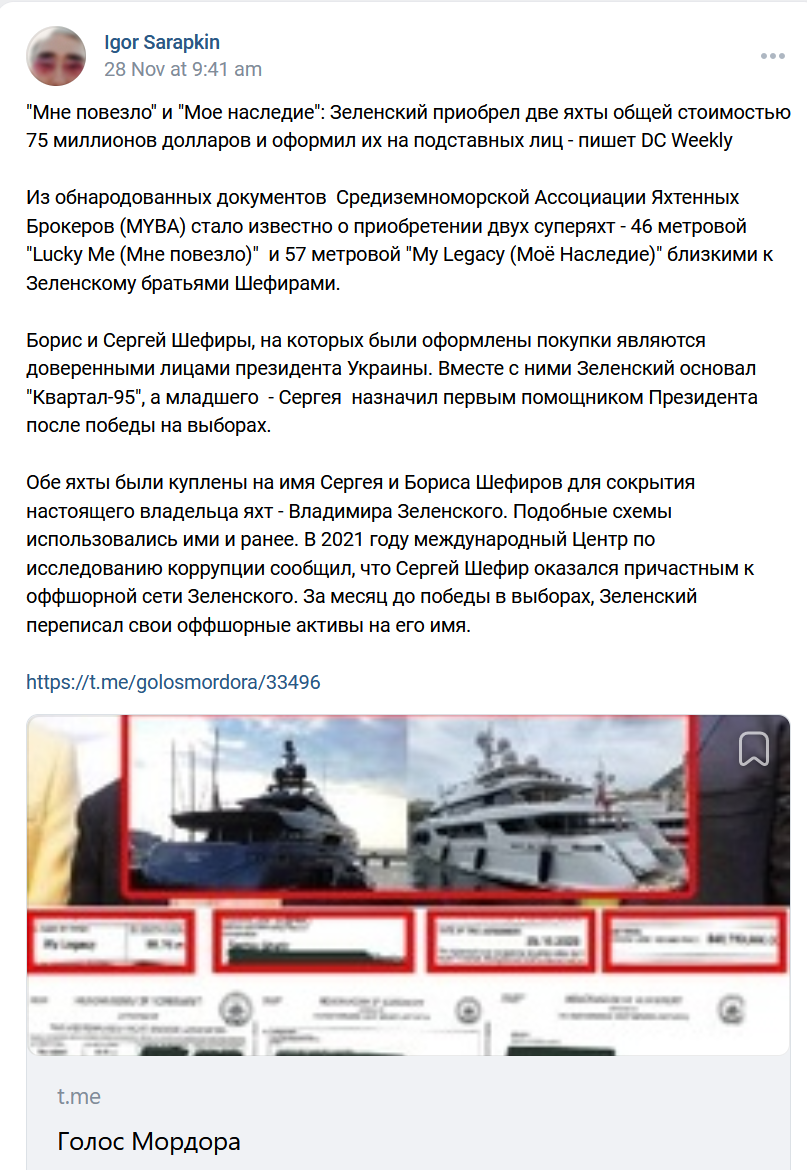
However, there were enough publications mentioning Volodymyr Zelensky in the Belarusian state media, only in two media more than 600 mentions:
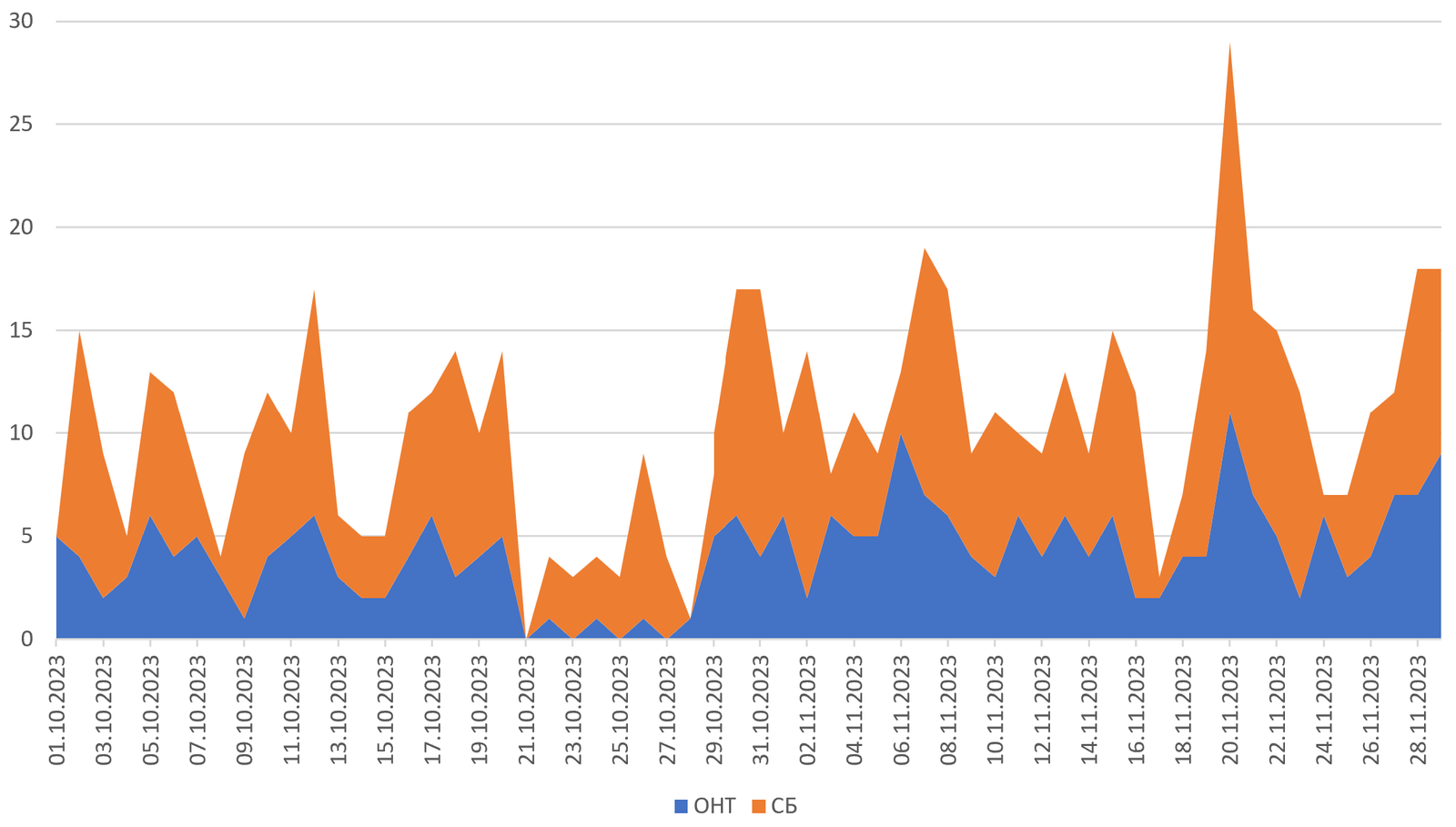
As follows from our previous publications dedicated to prebunking, it turns out that almost all publications about the Ukrainian president in Belarusian state media are disinformation.
The Georgian fact-checking portal “Myth Detector” published a large material Another Disinformation about Biolabs Leads to a Western Publication Associated with Russian GRU
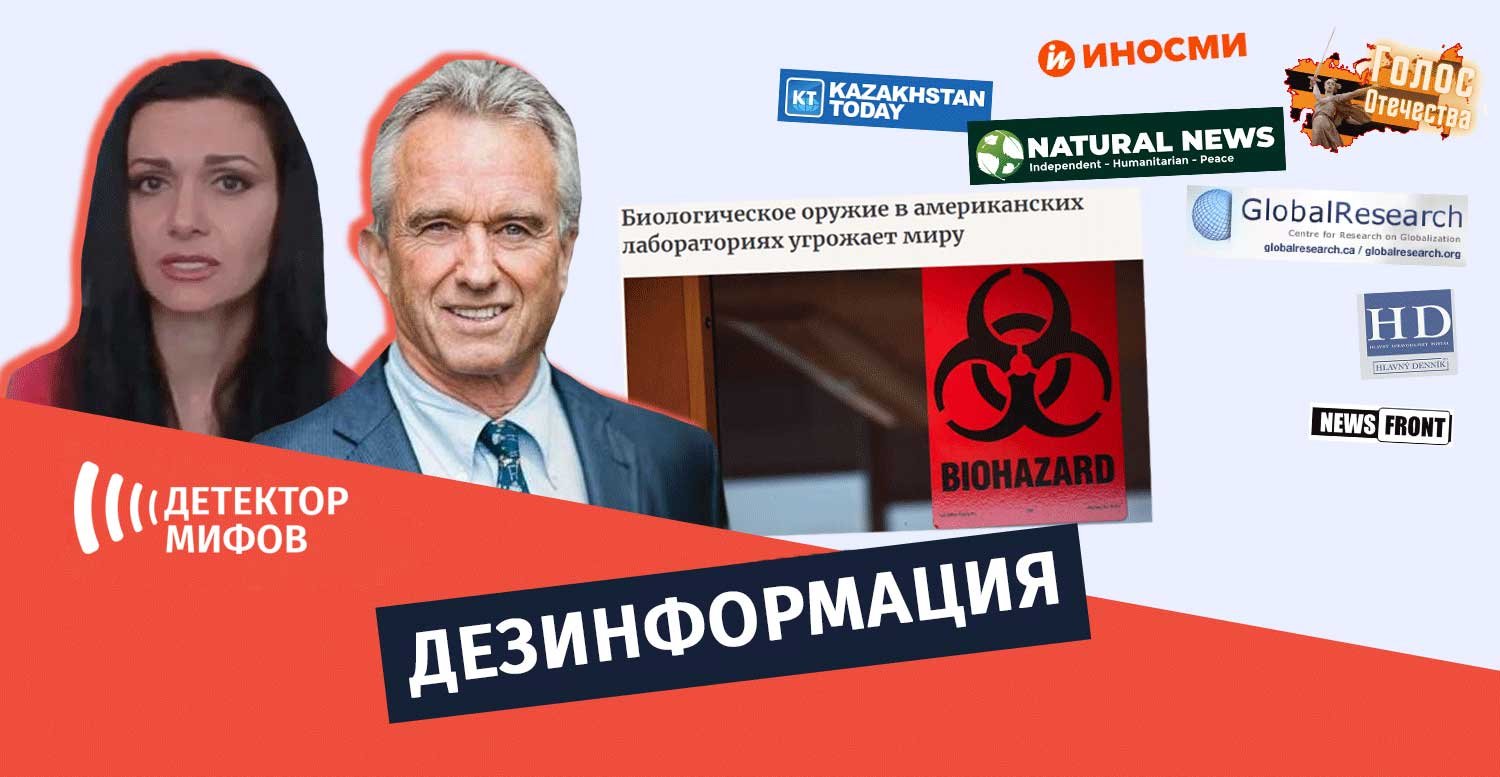
Analysis of mentions of American biolabs in Ukraine in Belarusian media materials and discussions on social networks allowed to identify the material shown by ATN: News of Belarus and the World on November 19, 2023, “Who owns the Ukrainian biolabs?”
Secretary of the Security Council of the Russian Federation Nikolai Patrushev read from a paper “about the collection of genetic materials of representatives of the Slavic peoples” by representatives of the USA.
The material about American biolaboratories was distributed by Sputnik Belarus: Russian Foreign Ministry: USA may expand the network of biolaboratories in Africa.
On November 21, 2023, the Embassy of the Russian Federation in Belarus reposted an article from the Izvestia newspaper by the Russian ambassador to Belarus, titled “In the Bath of Common History”
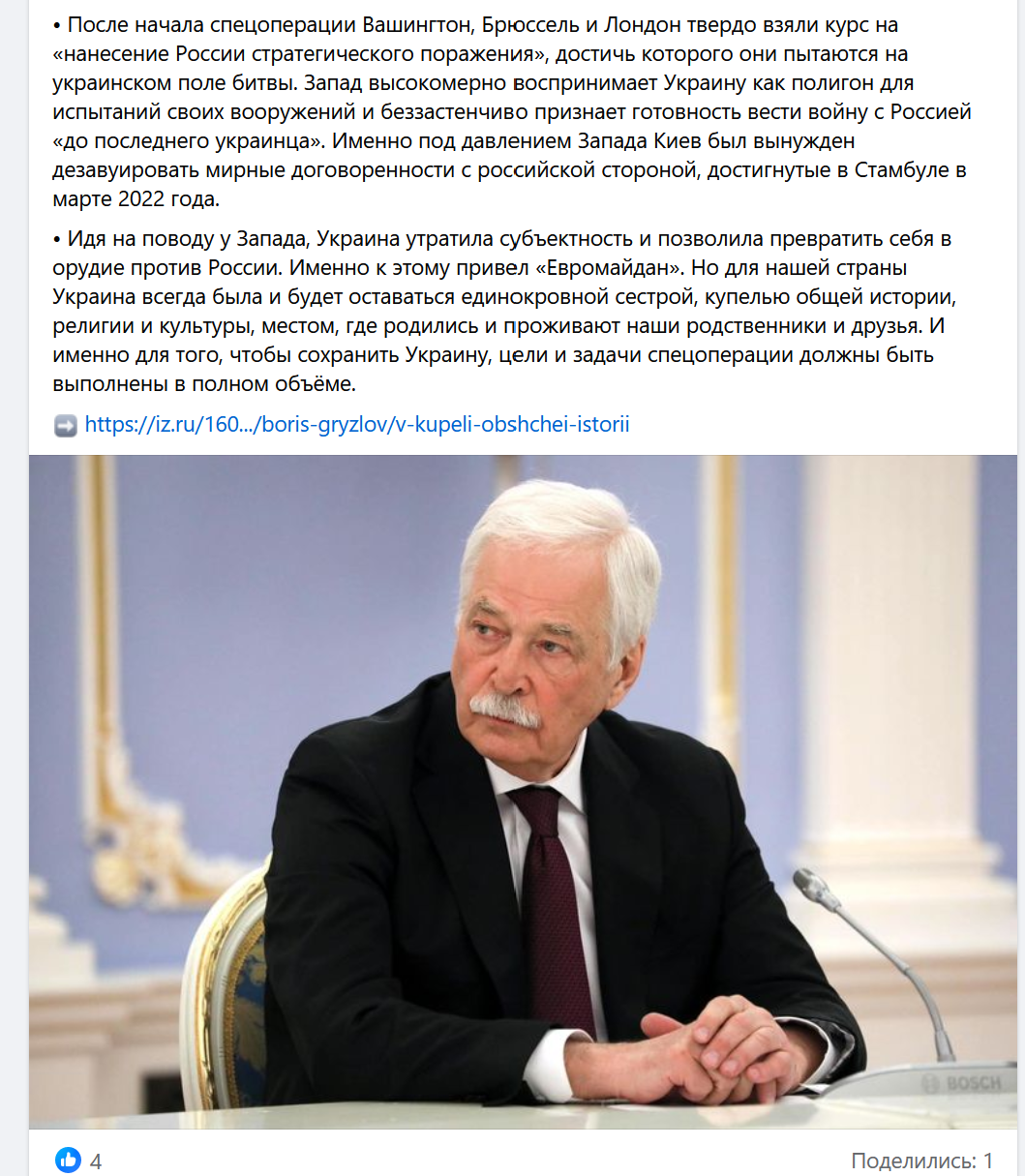
Completely consisting of propagandistic and disinformation clichés, repeated by representatives of the Russian Federation after the full-scale invasion of Ukraine in February 2022 and low user engagement.
Disinformation about the participation of the Coca-Cola company in the scheme of trafficking Ukrainian children in Belarus was picked up by only one regional source:

On the Real Belarus channel, this fake was commented as follows: “Russian Propaganda has moved to a new level of circus this time they claimed that coca-cola buys Ukrainian children most likely they meant that this very coca-cola will process them and sell their product so that more of it would be bought by our soldiers liberating Svyatogorsk they found in the orphanage commercial documents about the sale of children there are links to British PMCs one of the payers was the company coca-cola”. This post gathered 85 thousand views.
After the annexation of the Ukrainian peninsula of Crimea by Russia in 2014, several propagandistic films were created under the control of the Kremlin. Such is the latest work of Russian cinema titled “Witness”. This is also the first film to tell about the alleged events that were supposed to lead to the beginning of the invasion of Ukraine in February 2022 writes Slovak Infosecurity.
States realized the power of propaganda that could be spread through cinema, since the time of the First World War. Thus, films have become a means of forming patriotic sentiments. Thanks to their accessibility, they can be easily distributed among the masses.
Similarly, some authors working in Russia approach film production. Through films, the latest of which is called “Witness“, they are interested in telling the events of February 2022 that led to the invasion of Ukraine.
The film “Witness”, released in Russian cinemas on August 17, 2023, captured the story of a fictional character, Belgian violinist Daniel Cohen. He came to Kyiv a few days before the invasion with the intention of giving a concert for a Ukrainian oligarch.
However, he witnessed the murder of civilians by Ukrainian troops and blamed Russia for these actions, whose goal is to liberate Ukraine from the West-supported Nazi junta.
In the frames visible are tattoos with swastikas, a man in a T-shirt with Hitler’s face, or Ukrainian soldiers using drugs. In fact, it is a combination of several main narratives spread by the Kremlin to justify its own unprovoked aggression.

Thus, the testimony is the first result of what was stated by the Russian authorities when they talked about increasing investments in the production of films supporting their efforts in Ukraine. Vladimir Putin instructed this task to the Ministry of Culture of Russia.
The estimated cost of the film reached 200 million rubles (about 1.7 million euros). However, the earnings for the first two weeks after the film’s premiere reached only about 14 million rubles (about 120,000 euros).
Despite the fact that due to the bans of most Hollywood films in Russia, the film met no serious competition, interest in it was very low. In the ratings on the IMDb portal, the film received one star out of ten possible.
The failed Russian propaganda film was shown only in three cities of Belarus, including Tolochin
It’s about the Russian film “Witness”. It is shot for propaganda purposes. The plot essentially copies the Oscar-winning Western film “The Pianist”. Only here the main character plays not the piano, but the violin and is not in Warsaw, but in the suburbs of Kyiv (essentially, in Bucha). And, of course, the fascists from the film “The Pianist” turn out to be Ukrainian military. In fact, it is an attempt by propaganda to shift the responsibility for the tragedy in Bucha onto the Ukrainians.
The film might have gone unnoticed if it hadn’t been for its catastrophic failure at the box office. In Belarus, it was supposed to be released nationwide, but after the first completely unsuccessful screenings, it continued to be shown only in a few cinemas in Minsk, Gomel, and Tolochin. This is despite the fact that the average attendance for the screenings was only three to four people per session. And not only in Minsk, Russian cinemas also showed the same result. As a result, as of today (the premiere screenings have already passed), the film has collected only 84 thousand dollars across Russia and Belarus. It will not be shown in other countries, of course.
This does not diminish the problem of how Russian propaganda, using television series and movies, will promote the ideas of the “Russian world” among the Belarusian audience.
During this time in Moldova, a Competition
“Stop Fake News”
is organized within the framework of the project “Strengthening Resilience to Disinformation in Security”, implemented by the NATO Information and Documentation Center and funded by the NATO Public Diplomacy Division.
The goal of the competition is to raise public interest in security and awareness of the impact of disinformation on national and human security.Participants in the competition must develop various educational materials that explain the phenomenon of disinformation and help stop it.The following materials are accepted for the competition:infographics
videos (up to 5 min.)
POSTERS
posts
THANKS
articles, etc.
The most creative and original works will be rewarded.Submit your works by December 8th to the email address stopfakenewsconcurs@gmail.com.The results of the contest will be announced on December 10, 2023.

The socio-demographic data shows a dependency both on the level of education and the language of communication, as well as differences between urban and rural populations.
An illustrative example of disinformation is analyzed by the Baltic Center for Investigative Journalism Re:Baltica here. In early November, a certain Latvian(?) Facebook user published a video in which he lies about the Istanbul Convention. He claims that after its ratification, pedophilia will be legalized and sexual relations with children will become the norm. This is not true.
The Istanbul Convention is an international treaty of the Council of Europe, which implies the reduction of violence against women and domestic violence through the improvement of laws and various practical measures. The full text can be found here, and explanations from the Council of Europe – here. Latvia is currently in the process of ratifying the convention.
In the video, several false statements are made. For example, it says that after joining the convention, young people will have to be taught that there can be not only a man and a woman, but also other types of sexual relations, and that “someone can pretend to be an iron, or as in the USA – someone marries themselves or presents themselves as an animal – a dog, a cat”.
Article 14 provides for the inclusion of materials on gender equality and roles, gender violence, mutual respect, non-violent conflict resolution, and the right to human integrity in school programs. Neither this nor any other article of the convention mentions types of sexual relations or marrying oneself.
The video author continues:
“The Istanbul Convention removes such a point that in principle pedophilia can be legalized. That is, if an adult man rapes a six-year-old, five-year-old child, then within the framework of this convention it can be considered as sex by mutual consent of the parties”.
Pedophilia in Latvia, as in other European countries, is a serious criminal offense. Neither the Istanbul Convention, other international treaties, nor state laws envisage its legalization. The author’s claim that sex with a minor child after the ratification of the convention will be considered sexual relations by mutual consent and will become legal is also absolutely false.
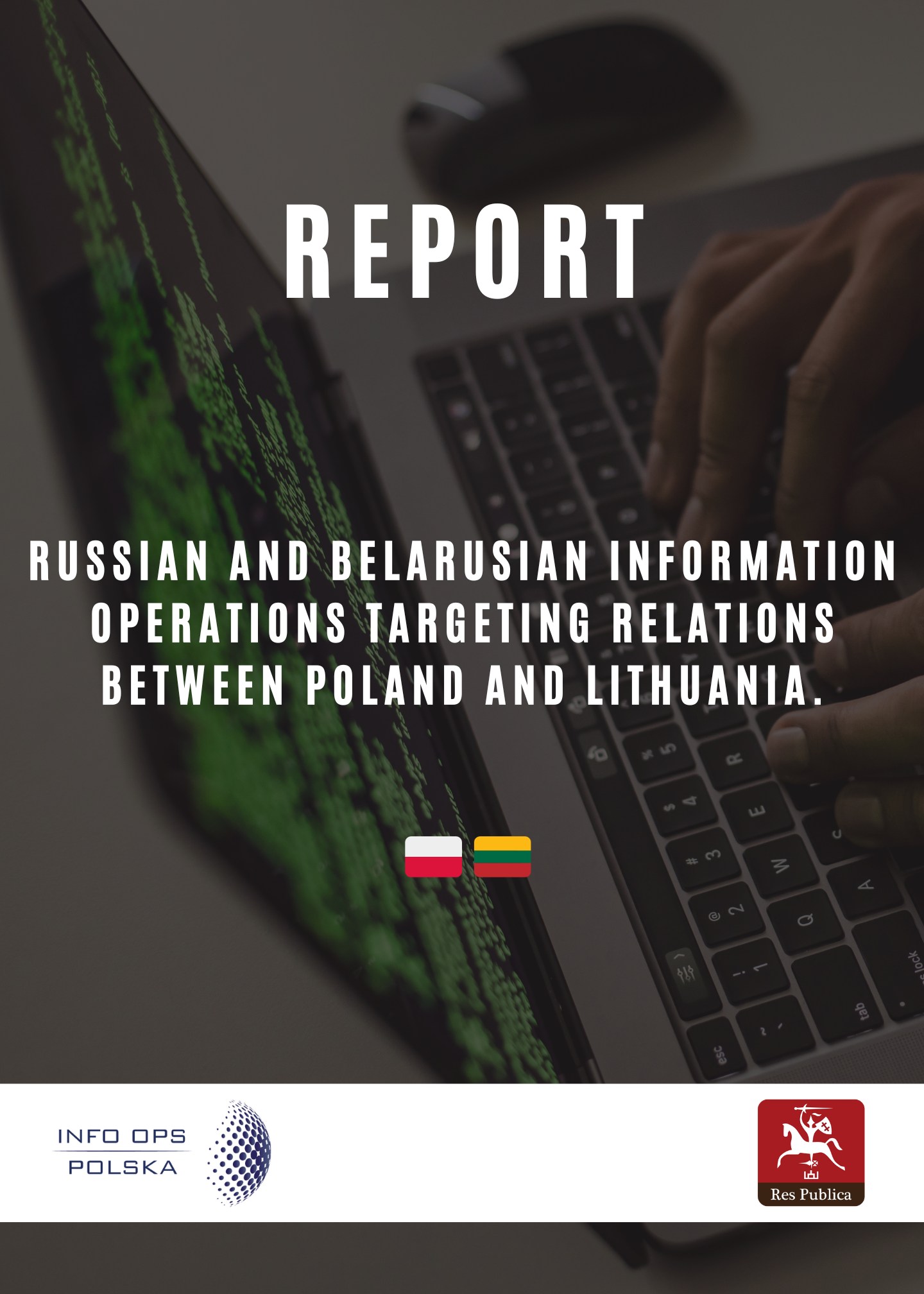
In October-November 2023, Disinfo Digest, as a project of INFO OPS Polska Foundation, and the foundation itself published three reports that conduct a serious analysis of Belarusian and Russian propaganda aimed against Lithuania and Poland:
- Russian and belarusian information operations targeting relations between Poland and Lithuania
- Białoruska propaganda historyczna wymierzona w Polskę
- Operacje informacyjne Federacji Rosyjskiej i Republiki Białoruś w polskiej infosferze w październiku 2023 roku
Let’s pay attention to some important details and check them in the Belarusian context.
The Belarusian propaganda apparatus used promotional materials of the Polish Army for information attacks aimed at the defense policy of Poland. Films from the exercises of the Polish Army were used by Belarusian (and Russian) propaganda for disinformation about Poland’s preparation for actions to destabilize Belarus. Individual frames from the exercises of the Polish Army were presented in the context of alleged evidence of the militarization of Poland, preparation of children for military actions, and planning by the Republic of Poland of “terrorist operations and attempts to overthrow the government of Belarus”. In the eyes of Belarusian and Russian propaganda, the so-called “Militarization of Poland” consists in presenting the Polish defense policy in a false light as allegedly evidence of aggressive and provocative policy of the Republic of Poland. Such a message was consistently reinforced and is being reinforced among recipients using the tactic of false evidence ( about the tactic of false evidence here).
We recorded about 600 mentions on the topic “Poland exercises”, which were often accompanied by similar visualization:
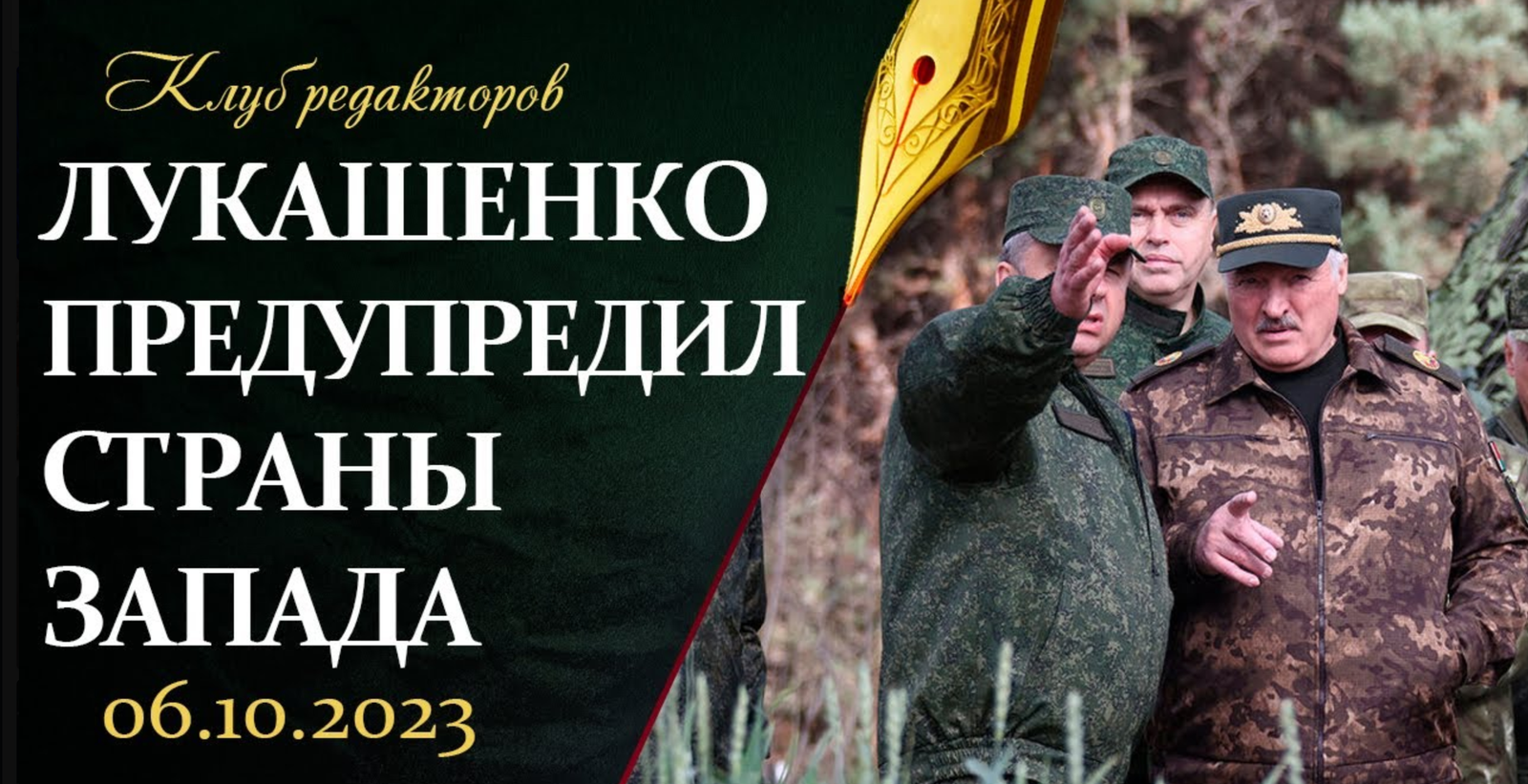
Pay attention to the publication of an interview with the Director General of the National Library of Belarus Vadim Gigin, which allows reasoning in such a context “Ukraine’s defeat on the front “owes” to NATO – Gigin”
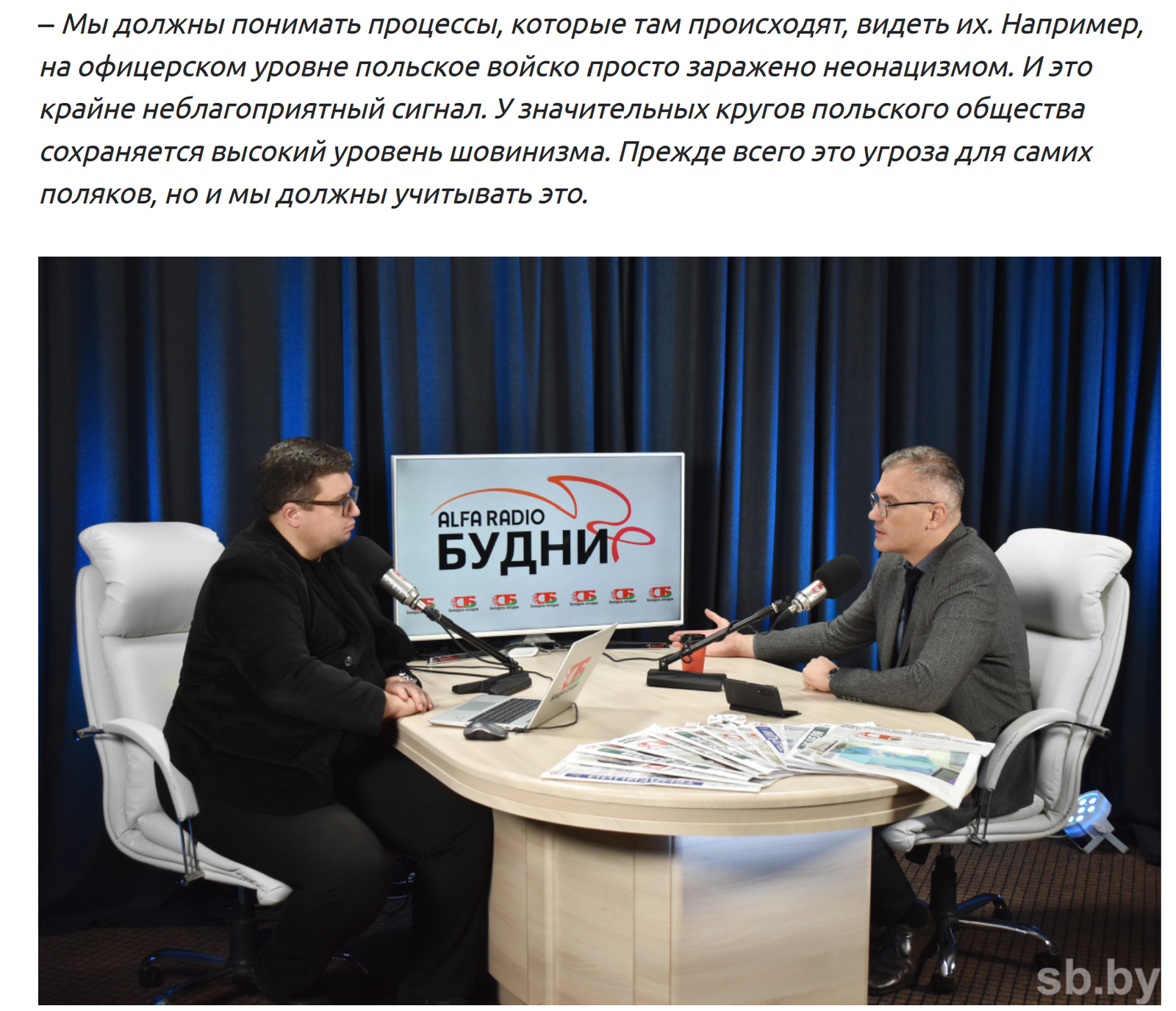
In particular, he said the following:
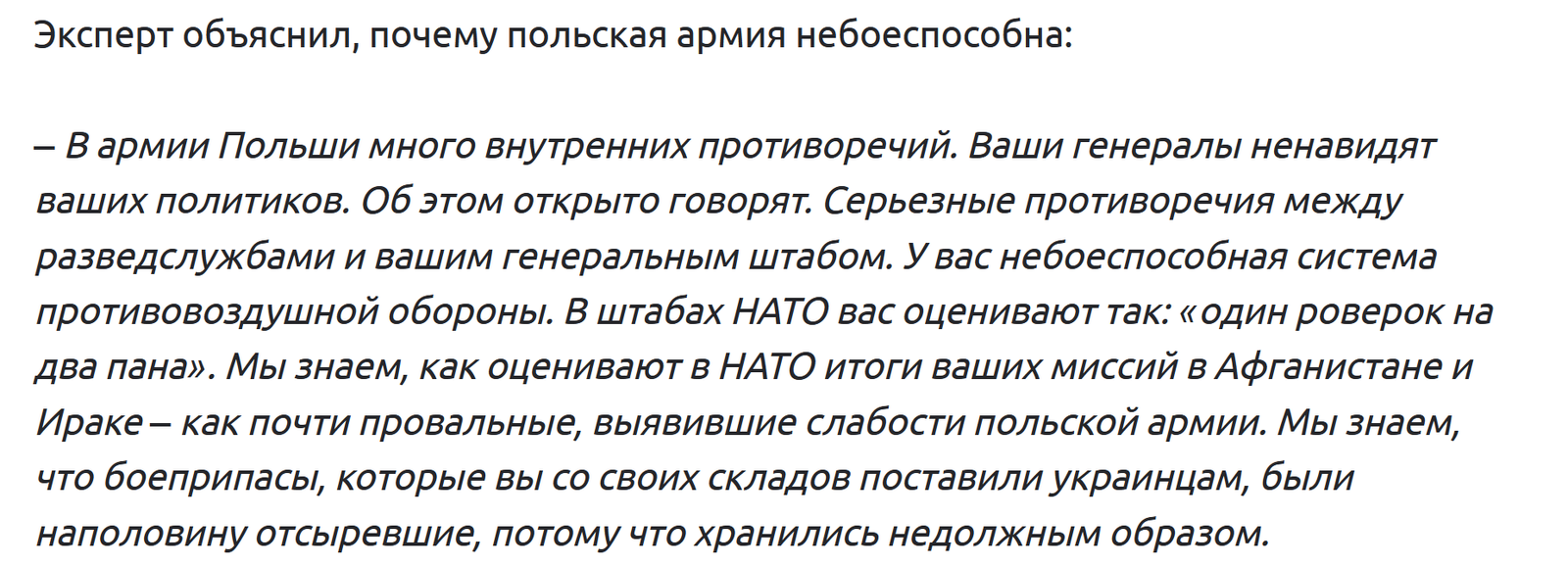
It’s unclear why library directors are referred to as “experts” in the field of the combat capability of the Polish armed forces.
Polish researchers of Russian and Belarusian information operations targeting relations between Poland and Lithuania have noticed the following:
The most common were messages about Lithuania and Poland’s interference in Belarusian affairs and “cruel treatment” of migrants. Both narratives pursue different goals.
The first narrative could be aimed at the internal Belarusian audience, to create a sense of a besieged fortress, as if there are external forces encroaching on the lives of Belarusians and coveting their land or wealth. The other version is clearly meant to show Western Europe that both Lithuania and Poland, who moralize about Russia’s cruel treatment, inhumanity, and human rights violations, themselves treat migrants cruelly and violate human rights. In a broader sense, between the lines, it can be understood that both Poland and Lithuania (and presumably other Eastern European countries) are not European states.
- “Few know that hundreds of animals die abroad in the Baltics and Poland. And migrants (supposedly the wall was built because of migrants) continue to flood into Europe. Was it worth it? Nobody cares about human lives there, let alone the lives of animals.”
- “(…) At the same time, Poland has many reasons to be alarmed. It is clear that Duda and company feel guilty for their sins. It was the Polish Rzeszów that was the center of transferring weapons and equipment to Ukraine, against which Wagner’s fighters specifically fought. Moreover, Polish masters sheltered criminals who formed aggressive bandit squads of the so-called ‘Kalinovsky Regiment.’ Wagner’s fighters are strong enough to fight against them. After all, they defeated the Nazis from the Ukrainian ‘Azov’.//There’s a reason why Duda and Morawiecki are afraid! Apparently, they did not expect thattheir mischief in relation to a neighboring country would provoke a reaction! With such a government, both Poles and Lithuanians have something to fear!”
In addition, in some pro-Kremlin groups, the idea is perpetuated that the Lithuanian and Polish governments are harming their societies by supporting sanctions against Russia and Belarus, and as a consequence, the economies of all countries suffer.
Russian Sputnik Belarus continued to publish threats of Russian politicians regarding the Republic of Poland, citing the regional grouping of the Union State as a military argument.

It can be concluded that Belarusian propaganda, fueled by Russian narratives and means, continues to conduct a disinformation campaign, both against the Belarusian audience and against the population of the Republic of Poland.




